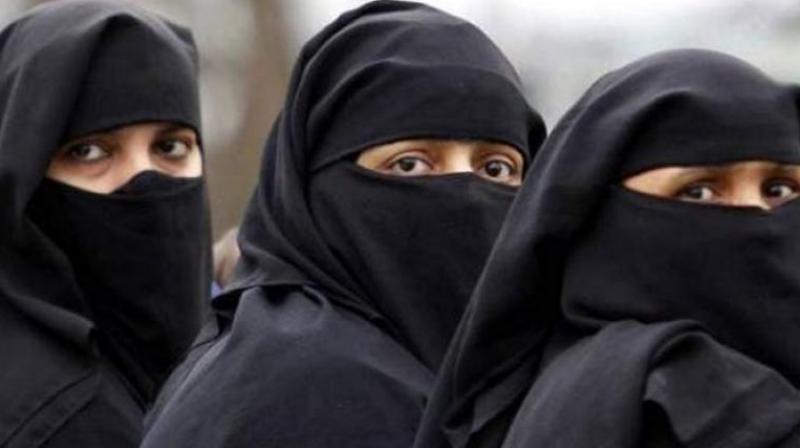BJP piggybacking on reform' to win polls
The question of banning triple talaq is part of the BJP's stated goal of expediting the adoption of a uniform civil code (UCC).

The the spian qualities of outrage that Ravi Shankar Prasad displayed when speaking of the BJP’s views on the practice of triple talaq among Muslims in India were quite transparent. As a lawyer, he must have been aware that the matter is sub judice before the Supreme Court. While the NDA government has filed an affidavit before the SC opposing the practice, the judgment is still awaited. Did the renewed burst of indignation then have less to do with a suddenly reignited desire for social reform, and more to do with the ongoing UP Assembly elections, and the falling electoral prospects of the BJP?
The question of banning triple talaq is part of the BJP’s stated goal of expediting the adoption of a uniform civil code (UCC). The goal by itself has the sanction of the Constitution, but in a specifically conditioned manner. Article 44, which states “that the State shall endeavour to ensure for the citizens a uniform civil code throughout the territory of India”, was deliberately placed by the makers of our Constitution in the section on Directive Principles in order to stress the element of discussion and consensus that should inform such endeavours.
The problem is that the BJP has decided, somewhat selectively, to select this one Article from among the Directive Principles, and then proceed to try and implement it in a manner that closely resembles a bull in a china shop. No one can deny the need for all religion-based personal laws in India to change in accordance with modern notions or reform, equity and gender justice. But, in order for this process to be sustainable and enduring, it is imperative to think about how these ends are best achieved.
On October 7, 2016, the Law Commission shot off a letter to chief ministers enclosing an objective-type questionnaire on the need for an UCC. Nitish Kumar, was the first CM to reply to that letter. He said that he had examined the questionnaire carefully, but it was his considered view that the questions were framed in such a way as to force the respondents to respond in a specific manner. Complex issues, he said, cannot be tackled through such an amateurish approach. The UCC must be seen as a measure of reform for the welfare of the people, and not a political instrumentality to be hurriedly imposed against their wishes and without consultations with them.
Democracy is based on the foundational principle of a constructive dialogue. Where the UCC is concerned, such a dialogue, based on broad-based consultations with all religious denominations, is particularly necessary given the multi-cultural, multi-religious nature of our society. In the absence of such in-depth consultations, any attempt at premature or hasty tampering with long standing religious practices that deal with complex issues of marriage, divorce, adoption, inheritance and the right to property and succession, would, Mr Kumar stressed, be inadvisable.
What the BJP does not want to understand is that the enforcement of a UCC would require all current laws applicable in such matters in respect of Muslims, Christians, Parsis and Hindus (including Buddhists, Sikhs and Jains) to be scrapped. Does the Central government have a draft of such a law, with concrete details of which provisions of what religion are to be scrapped, and what will replace them? No such draft has been circulated. The stakeholders are in the dark about what is being proposed and what is to be replaced. Nor has there been any discussion on this subject in Parliament, the Legislative Assemblies of states and other forums of civil society.
The essential point is that while the State must, indeed, endeavour to bring in the UCC, such an effort, in order to succeed in any meaningful way, must be based, to the greatest extent possible, on a broad consensus within religious denominations in favour of such a move, rather than be imposed by fiat from above. If such an approach is not adopted, there could be avoidable social friction, and an erosion of faith, specially among minorities, in the constitutional guarantee of freedom of religion.
Political maturity requires that on the issue of triple talaq all parties await the judgment of the Supreme Court. Equally, on the question of the UCC, statesmanship requires the government to initiate a process of persuasion and consultation with different sections of the Muslim community on the desirability of reform. Unfortunately, the BJP is showing neither maturity nor statesmanship in this matter.
What is on display is rank opportunism, which reduces a serious matter like the UCC to an electoral ploy whose aim is polarisation of votes for short-term electoral gain. The stridency with which Mr Prasad took up the issue of triple talaq on the eve of the ongoing Assembly elections, and in particular, the UP elections, clearly shows what the BJP’s real intention appears to be.
It is ironic also that the BJP, when raising the issue of triple talaq, is claiming to speak for the interests of Muslim women when rabid BJP leaders like Yogi Adityanath, Vinay Katiyar and Suresh Rana are at the same time busy demonising the Muslim community as a whole. No one from the top leadership of the BJP has condemned this fanaticism, and even if there is a token reproof, it hardly carries any conviction, given the fact that such attacks, specially at the time of elections, have become standard BJP policy of divide in order to rule.
The Muslim community has many credible voices seeking reform of their personal laws in conformity with modern notions of gender equity. But, when the BJP, while inciting violence and hatred against this very community, cynically seeks to amplify these voices at the time of elections, the project of reform itself is devalued.

